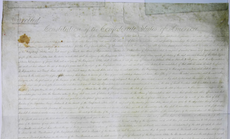- 1 2 3 4 Cutler, H.G. (1923). History of Florida : past and present, historical and biographical, volume III. Lewis Publishing Company. pp. 8–10.
- ↑ Smith, Julia Floyd (2017). Slavery and plantation growth in Antebellum Florida, 1821-1860. Gainesville, Florida. ISBN 978-1-947372-62-7. OCLC 1079199321.
{{cite book}}: CS1 maint: location missing publisher (link) - ↑ "Marion County, Florida 1860 slaveholders and 1870 African Americans". freepages.rootsweb.com. Retrieved February 22, 2022.
- ↑ "Florida Secession". www.colket.org. Retrieved February 21, 2022.
- "Mrs. James B. Owens". The Ocala Evening Star. November 21, 1907.
James Byeram Owens | |
|---|---|
| Deputy from Florida to the Provisional Congress of the Confederate States | |
| In office February 4, 1861 –February 17, 1862 |
